Pharm Yaks
A hybrid podcast for aspiring pharmacy technicians and pharmacists. Each week, human producer and lifelong learner Adam Snetiker brings you a new conversation that takes place between two AI hosts, generated by Google’s NotebookLM. Please excuse any pronunciation errors; artificial voices aren’t perfect.
Episodes
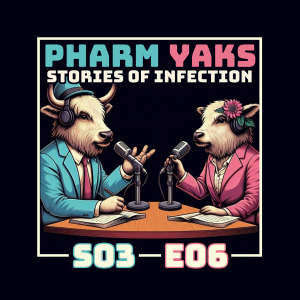
Wednesday Oct 23, 2024
Fungal Infections and More
Wednesday Oct 23, 2024
Wednesday Oct 23, 2024
The conversation explores the mechanisms by which microbes cause disease in humans, again focusing on the stages of entry, colonization, persistence, replication, exit, and evolution. It then examines the host immune defense system's common themes of protection, detection, deployment, elimination/tolerance, and memory.The podcast hosts also describes the clinical presentation of various infectious diseases caused by fungi, worms, mites, ticks, and mosquitos. Additionally, they provides detailed information on the microbiology, pathophysiology, and immunology of scabies, malaria, cysticercosis, aspergillosis, Candida infections, and Rocky Mountain Spotted Fever. Lastly, the discussion highlights the role of economic and social barriers to care in patients' decisions to seek medical attention.
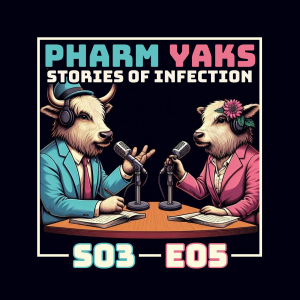
Monday Oct 21, 2024
Viral Infections, Part 2
Monday Oct 21, 2024
Monday Oct 21, 2024
The second part of the viral infection conversation explores the mechanisms by which microbes cause disease in humans, emphasizing the stages of entry, colonization, persistence, replication, exit, and evolution. The AI hosts examines the human's immune response, focusing on the processes of protection, detection/recognition, deployment, elimination/tolerance, and memory.This discussion includes the specific cases of measles and rotavirus to illustrate these concepts and analyze clinical presentations of the respective diseases. Additionally, the Pharm Yaks hosts explain the microbiology, pathophysiology, and immunology of various infections, including mononucleosis, viral meningitis, herpes simplex virus, measles, rotavirus, and severe combined immunodeficiency. Finally, they reiterate - for the fourth time - how economic and social barriers can influence patients’ access to medical care, using the examples of vaccine hesitancy and the challenges faced by families of children with SCID.
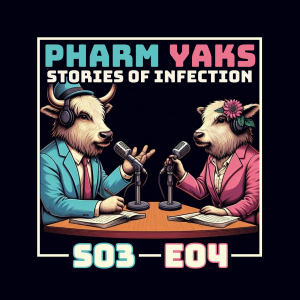
Friday Oct 18, 2024
Viral Infections, Part 1
Friday Oct 18, 2024
Friday Oct 18, 2024
The hosts explore the mechanisms of how viruses infect humans, including the stages of entry, colonization, persistence, replication, exit, and evolution. The discussion then shifts to describe the human body's immune system response to viral infection, encompassing protection, detection, deployment, elimination, and memory. The conversation further examines the clinical presentations of specific viral diseases like chickenpox, shingles, and hepatitis B, delving into their microbiology, pathophysiology, and immunology. Finally, the AI hosts once again analyze the impact of economic and social factors on access to healthcare, demonstrating how these barriers can hinder timely diagnosis and treatment of viral infections.
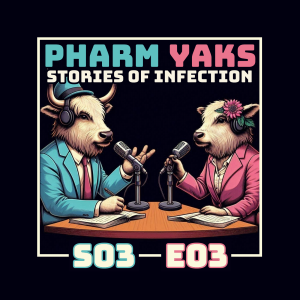
Wednesday Oct 16, 2024
Bacterial Infections, Part 2
Wednesday Oct 16, 2024
Wednesday Oct 16, 2024
Today we continue the conversation that focuses on the mechanisms of bacterial infections, particularly on the steps bacteria take to cause disease in humans, the body's immune responses to these infections, and the clinical presentations of several bacterial diseases. The Pharm Yaks hosts uses the specific cases of Irena (orbital cellulitis) and Chuan Li (sepsis) to illustrate how these factors play out in real-world scenarios. They also reiterate the influence of socioeconomic factors on a patient's decision to seek medical care, underscoring the importance of addressing these barriers to ensure timely and effective treatment.
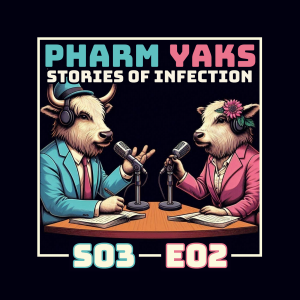
Monday Oct 14, 2024
Bacterial Infections, Part 1
Monday Oct 14, 2024
Monday Oct 14, 2024
This conversation explore the mechanisms of bacterial infections and the human immune system's responses to them. Specifically, the podcast hosts delve into the common behaviors of bacteria that enable them to cause disease, such as entering the body, colonizing tissues, persisting, replicating, exiting, and evolving. The discussion then examines the host immune system's protective measures, detection and recognition of pathogens, deployment of defenses, elimination or tolerance of invaders, and the development of immunological memory. Further, we explore the clinical presentations of various bacterial infections, including tuberculosis, gastrointestinal infections, heart infections, pneumonia, strep throat, and gastritis. Finally, the AI hosts discuss the impact of economic and social barriers on access to healthcare and how these factors influence disease progression.
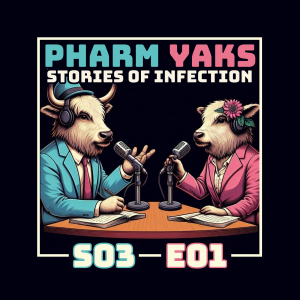
Friday Oct 11, 2024
Introduction to Immunity
Friday Oct 11, 2024
Friday Oct 11, 2024
Welcome to season 3, where we learn about different types of infections that are caused by various pathogens: baceria, viruses, fungi, and more. This season is short because material is based on one individual Course, but there's plenty to learn. The course is also on Coursera and it's called Stories of Infection, offered by Stanford University.The first conversation offers an introduction to immunity, which explores the different components and functions of the immune system. The hosts focus on explaining how both the innate and adaptive immune responses work together to protect the body against pathogens, and highlights the consequences of a suppressed or dysfunctional immune system. Through the example of David Vetter, who suffered from Severe Combined Immunodeficiency (SCID), you'll see how a compromised immune system can lead to severe infections and ultimately death. While not explicitly focusing on cholera, the dicussion offers relevant concepts related to the microbiology, pathophysiology, and immunology of bacterial infections.
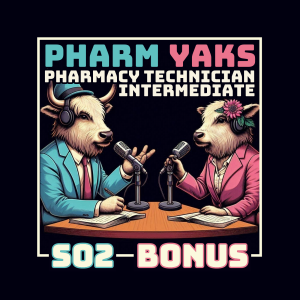
Friday Sep 27, 2024
HIV and AIDS
Friday Sep 27, 2024
Friday Sep 27, 2024
This conversation offers a comprehensive overview of HIV and AIDS, starting with their definitions and progression. The hosts then explore how viral infections, particularly HIV, impact the body's immune system. After that, the discussion delves into transmission modes, risk factors, and preventative measures, including the use of condoms and pre-exposure prophylaxis (PrEP). Finally, they cover testing procedures, counseling, and the importance of psychosocial support for individuals living with HIV/AIDS.Thank you for listening to season 2 of Pharm Yaks. Stay tuned for season 3 after a short break.
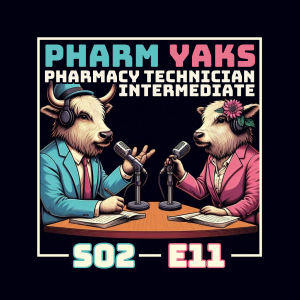
Wednesday Sep 25, 2024
Building Empathy
Wednesday Sep 25, 2024
Wednesday Sep 25, 2024
This conversation for pharmacy technicians is focused on building empathy and effective communication skills. The hosts emphasize the importance of understanding patients' perspectives and feelings through empathy, active listening, and open-ended questions. They further outline techniques for handling difficult conversations and providing excellent customer service over the phone. The discussion also highlights the importance of clear and respectful communication in fostering positive patient interactions and building trust.
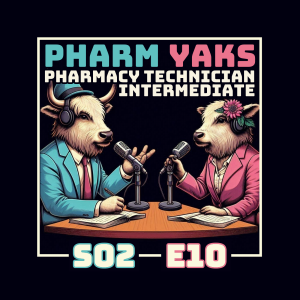
Monday Sep 23, 2024
Compounding Medications
Monday Sep 23, 2024
Monday Sep 23, 2024
This conversation about compounding medications focuses on the principles and techniques for preparing various dosage forms, including solids, semi-solids, powders, and sterile products. The hosts outline methods like geometric dilution and trituration for solids, levigation and spatulation for semi-solids, and explore the use of coloring and flavoring agents.The discussion further details calculations for different compounding methods, including weight in weight, weight in volume, and volume in volume calculations, as well as the allegation method. It also emphasizes the importance of aseptic technique and the use of a laminar flow hood when compounding sterile products. Last but not least, the hosts touch upon final checks and quality control procedures to ensure the safety and efficacy of compounded medications.
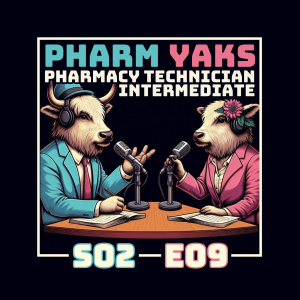
Friday Sep 20, 2024
Insulin
Friday Sep 20, 2024
Friday Sep 20, 2024
This conversation about insulin and syringes covers the management of diabetes, from the different types of diabetes to insulin administration methods. The hosts also explain compounding regulations and considerations for pharmacists, including the importance of ingredient quality, storage conditions, and labeling. The discussion emphasizes the need for proper quality assurance and control in compounding to ensure the safety and efficacy of medications.
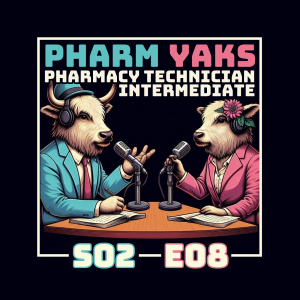
Wednesday Sep 18, 2024
Parenteral Solutions
Wednesday Sep 18, 2024
Wednesday Sep 18, 2024
This conversation is about parenteral solutions, which are medications administered directly into the body, bypassing the digestive tract. The hosts explain the different types of parenteral solutions, their administration routes, and the equipment and techniques used for their delivery. They also covers the safety precautions necessary to maintain sterility and prevent contamination.The discussion then goes into detail about various types of parenteral solutions, such as Large Volume Parenterals (LVPs) and Small Volume Parenterals (SVPs), and explains their differences. They also talk about the use of filters, administration kits, syringes, devices, and pumps for delivering these solutions. The conversation concludes by providing information about Total Parenteral Nutrition (TPN) and dialysis solutions, both of which are vital for patients with specific medical needs.
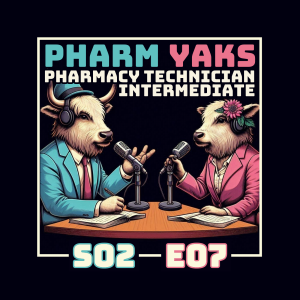
Monday Sep 16, 2024
Aseptic Techniques
Monday Sep 16, 2024
Monday Sep 16, 2024
This conversation focuses on aseptic techniques and safety guidelines in a pharmacy setting. The hosts emphasize the importance of these practices for protecting both pharmacy personnel and patients from contamination. They outline key steps in aseptic technique, including hand-washing, PPE use, and laminar flow hood operation, as well as OSHA guidelines for handling hazardous substances and proper disposal of instruments and clothing. The guideline document aims to ensure safe and sterile practices within the pharmacy environment to prevent contamination of medications and protect the health of both those working in the pharmacy and those receiving medication.
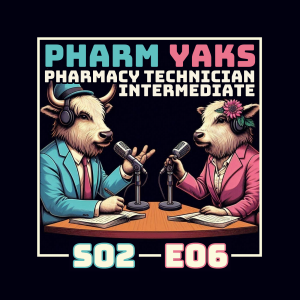
Friday Sep 13, 2024
MTM Services
Friday Sep 13, 2024
Friday Sep 13, 2024
Medication Therapy Management (MTM) is a patient-centered approach to healthcare that focuses on optimizing medication use and improving patient outcomes. MTM involves a team-based approach, empowering pharmacy technicians to play an active role in patient care, enhancing communication between healthcare professionals, and improving medication safety. MTM services include comprehensive medication reviews, patient education, and medication synchronization, with documentation and reimbursement processes using standardized methods. Pharmacy technicians contribute significantly to MTM by supporting pharmacists and physicians, assisting with documentation, monitoring medication safety, and interacting with patients to promote adherence and understanding of their medication regimens.
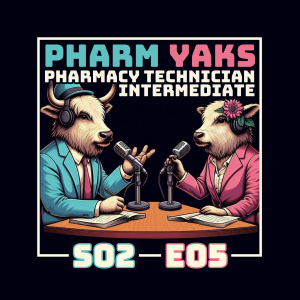
Wednesday Sep 11, 2024
Human Factors and Drugs
Wednesday Sep 11, 2024
Wednesday Sep 11, 2024
This conversation on drug activity focuses on the various factors that influence how drugs behave within the human body. It explores how individual differences, such as age, weight, genetics, and gender, can impact drug effectiveness, leading to varying responses like adverse reactions, hypersensitivity, and anaphylaxis. The hosts also examine how specific disease states, including hepatic, circulatory, renal, and thyroid conditions, can influence drug metabolism and elimination, emphasizing the need for personalized treatment approaches.
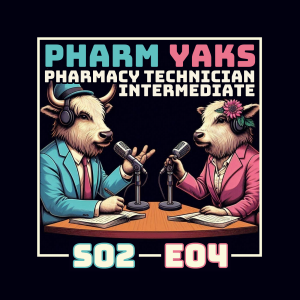
Monday Sep 09, 2024
How Drugs Work
Monday Sep 09, 2024
Monday Sep 09, 2024
The hosts explain the process of drug action in the body, from administration to elimination. This conversation highlights the importance of bioavailability and bioequivalence, which determine how much of a drug reaches the target site and how effective it is compared to other formulations. They also discuss the different routes of administration, drug interactions at receptor sites, and the ADME process (absorption, distribution, metabolism, and excretion) in addition to emphasizing the significance of drug concentration in achieving desired therapeutic effects while minimizing toxicity.
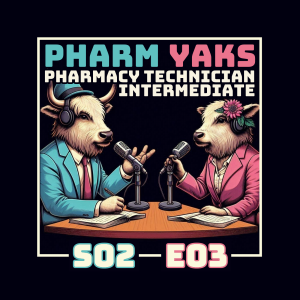
Friday Sep 06, 2024
Emergency Preparedness
Friday Sep 06, 2024
Friday Sep 06, 2024
This conversation focuses on emergency preparedness in healthcare, particularly for pharmacists and pharmacy technicians. It outlines the critical steps for planning ahead for emergencies like natural disasters and disease outbreaks, emphasizing the vital roles of pharmacists in medication management, communication, and community support. The hosts also underscore the importance of Basic Life Support (BLS) skills, including CPR and AED use, for all healthcare providers to ensure they can respond effectively to life-threatening situations.
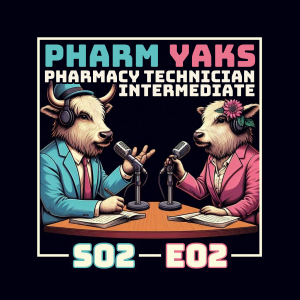
Wednesday Sep 04, 2024
Law and Ethics
Wednesday Sep 04, 2024
Wednesday Sep 04, 2024
This conversation details legal and ethical issues related to pharmaceuticals, encompassing drug regulation, testing, and trials. It emphasizes compliance with laws such as the Controlled Substances Act and HIPAA, outlining their requirements and implications for healthcare professionals. The hosts further examine controlled substances schedules, drug recalls, and other legal considerations, providing practical insights into handling medications and protecting patient safety.
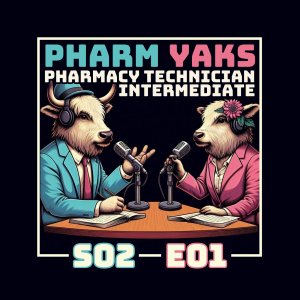
Monday Sep 02, 2024
HIPPA and HITECH
Monday Sep 02, 2024
Monday Sep 02, 2024
Today's conversation is about HIPAA (Health Insurance Portability and Accountability Act) and HITECH (Health Information Technology for Economic and Clinical Health), which are federal regulations designed to protect Protected Health Information (PHI), which is any information that can identify a patient and link back to them. These regulations mandate the standardization of electronic data exchange within the healthcare industry, establish national standards to protect the privacy of PHI, and impose penalties for non-compliance and breaches, which can range from civil to criminal penalties. The source also describes the impact of HIPAA and HITECH on pharmacy technicians, requiring them to adhere to stringent privacy and security standards, minimize PHI disclosure, and report any suspected privacy or security breaches.
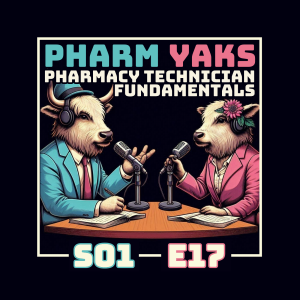
Monday Aug 26, 2024
Preparing Medication
Monday Aug 26, 2024
Monday Aug 26, 2024
This conversation is about the essential role of pharmacy technicians in the medication preparation process. The lessons highlight their primary function in interpreting prescriptions and preparing medications while working collaboratively with pharmacists.
The hosts also detail specific tasks, such as prescription processing, inventory management, compounding, and patient interaction. Importantly, they differentiate between discretionary duties, where technicians can exercise judgment, and non-discretionary duties, which require pharmacist oversight.
Finally, they discuss examples of scenarios that technicians may encounter, such as look-alike/sound-alike medications and prescription discrepancies, along with recommended practices for handling them.Thank you for listening to the first season of Pharm Yaks. Season 2 will be here after a short break.
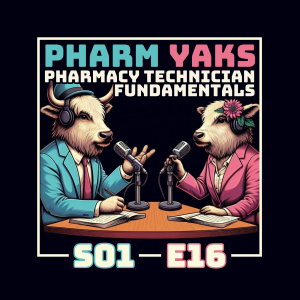
Friday Aug 23, 2024
Liquid Forms
Friday Aug 23, 2024
Friday Aug 23, 2024
This conversation is about liquid forms of medication, specifically solutions, suspensions, and emulsions. The hosts talk about the different properties of each type and the importance of emulsifiers in creating stable mixtures.
The lessons also detail the pharmacy technician's role in reconstituting oral antibiotics, a process that involves mixing a powdered medication with water to create a usable liquid. The hosts then outline the steps involved in reconstitution, including the importance of accurate measurements and shaking to ensure proper dispersion.
Finally, the discussion concludes with a demonstration of how to prepare different oral liquid medications, highlighting the unique procedures required for each formulation.
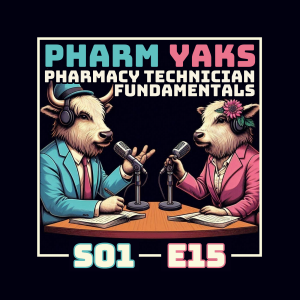
Wednesday Aug 21, 2024
Tablets and Capsules
Wednesday Aug 21, 2024
Wednesday Aug 21, 2024
This conversation is about the process of filling prescriptions for tablets and capsules. The lessons cover essential aspects such as prescription interpretation, understanding various tablet and capsule forms, using different filling machines and bottles, and demonstrating the proper steps of preparing, counting, pouring, and labeling medications. The objective is to prepare pharmacy students for the tasks involved in accurately and safely dispensing these common medication forms.
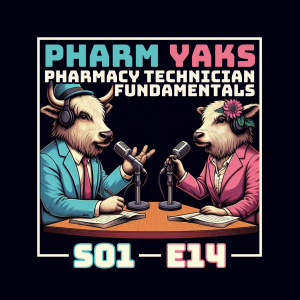
Monday Aug 19, 2024
Dosage Calculations
Monday Aug 19, 2024
Monday Aug 19, 2024
This conversation is about dosage calculations for medication administration. The lessons outline three basic methods: the formula method, dimensional analysis, and the ratio-proportion method.
The hosts also discuss various formulas for calculating pediatric dosages, including Clark's Rule, Young's Rule, and Fried's Rule. Finally, they explain infusion calculations for flow rate and drip rate, providing the formulas for determining the appropriate values.
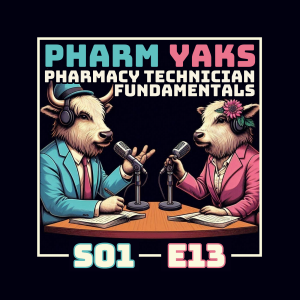
Friday Aug 16, 2024
Pharmacy Equipment
Friday Aug 16, 2024
Friday Aug 16, 2024
This conversation is about the equipment and software used in a pharmacy setting. The lessons cover the tools for weighing, mixing, counting, and dispensing medications, including balances, volumetric glassware, spatulas, and automated dispensing machines. The hosts explain the differences between non-sterile and sterile compounding, highlighting the importance of a sterile environment for intravenous solutions and injections.
They also outline the functions of pharmacy software programs, focusing on prescription management, inventory tracking, patient records, compliance, and reporting, including activity summaries and prescription logs.
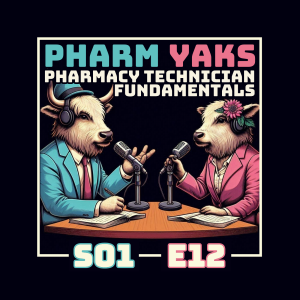
Wednesday Aug 14, 2024
Common Drugs
Wednesday Aug 14, 2024
Wednesday Aug 14, 2024
This conversation is about the development, classification, dosage forms, administration routes, and therapeutic uses of drugs. The lessons emphasize drug naming conventions, outline key reference books used in pharmacy practice, and provide examples of common medications and their applications in treating various ailments.
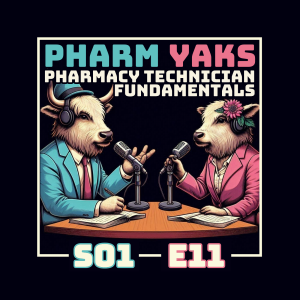
Monday Aug 12, 2024
The Pharmacy Technician
Monday Aug 12, 2024
Monday Aug 12, 2024
This conversation is a deep dive into the role of the pharmacy technician. The lessons provide an overview of the pharmacy technician profession, outlining the necessary skills and attributes, daily responsibilities in both retail and hospital settings, and the training and certification requirements. The hosts also explores common medical terminology, drug classifications, abbreviations used in the pharmacy, and the types of disorders treated with medication, emphasizing the importance of accuracy, patient safety, and communication in this vital role within the healthcare system.
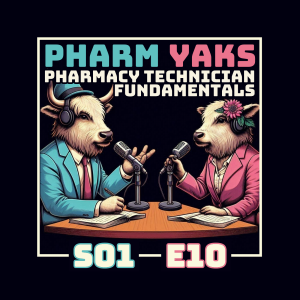
Friday Aug 09, 2024
Pharmacy Settings
Friday Aug 09, 2024
Friday Aug 09, 2024
This conversation is about the different settings in which pharmacists practice. The lessons compare and contrast their characteristics, advantages, and disadvantages as they examine three main types of pharmacy settings: community pharmacies, hospital/institutional pharmacies, and mail-order pharmacies.Each type of pharmacy plays a distinct role in the healthcare system and caters to different patient needs, ranging from providing personalized service and counseling to dispensing medications directly to patients through the mail. The hosts help you to understand the unique features and challenges faced by pharmacists working in each setting.
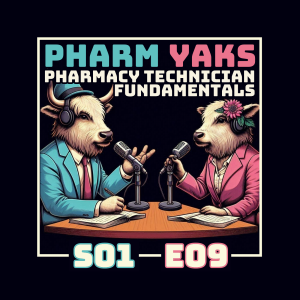
Wednesday Aug 07, 2024
Pathology Overview
Wednesday Aug 07, 2024
Wednesday Aug 07, 2024
This conversation offers an overview of human anatomy and physiology, focusing on important concepts like homeostasis and pathology of diseases. The lessons explain how the body is organized into regions, quadrants, and cavities, and discuss pathological conditions related to nutrition, hydration, and body temperature.The hosts also discuss the functions of the eleven organ systems: skin, bones, muscles, nerves, endocrine system, cardiovascular system, lymphatic system, respiratory system, digestive system, urinary system, and reproductive system.
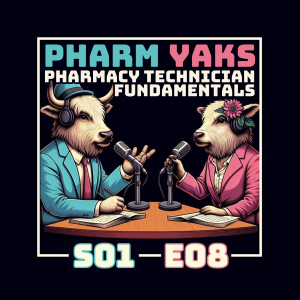
Monday Aug 05, 2024
Cell Biology
Monday Aug 05, 2024
Monday Aug 05, 2024
This conversation is about the fundamental building blocks of life: cells. The lessons delve into the pathology of cells, examining how changes in their structure and function can lead to various diseases.The hosts have centered their discussion around different types of cell growth, including benign and malignant neoplasms, as well as the various types of cells and tissues found throughout the body, each specialized to perform specific functions.
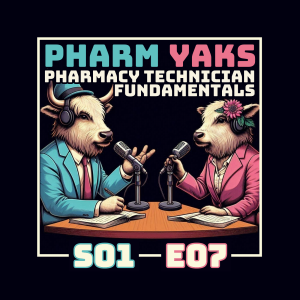
Friday Aug 02, 2024
The Human Body
Friday Aug 02, 2024
Friday Aug 02, 2024
This conversation is all about the human body, including its structure (anatomy) and function (physiology). The lessons outline various medical treatments and therapies, including curative, supportive, abortive, combination, pharmacotherapy, and preventative approaches.The hosts further explore pathology, the study of diseases, their structural and functional changes, and diagnostic techniques. They also define key directional terms used to describe body regions relative to each other and introduce anatomical planes for visualizing body sections.Finally, the discussion concludes by emphasizing the interconnectedness of structure and function through the Principle of Complementarity, highlighting the importance of understanding these fundamental concepts in healthcare.
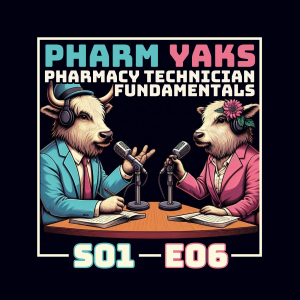
Wednesday Jul 31, 2024
Medical Terminology
Wednesday Jul 31, 2024
Wednesday Jul 31, 2024
This conversation provides an introduction to medical terminology and fundamentals of anatomy. The lessons emphasize the importance of understanding how word parts combine to form complex terms.The hosts define and explain the three key components of medical terms: prefixes, word roots, and suffixes, demonstrating how these parts contribute to the overall meaning of a term. Furthermore, they discuss the use of combining forms, which are word roots joined with a vowel to facilitate pronunciation. The section then guides the student on how to analyze medical terms by breaking them down into their constituent parts, ultimately enabling better comprehension of medical vocabulary.
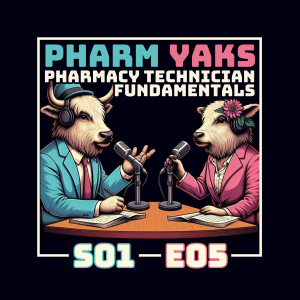
Monday Jul 29, 2024
Professional Behavior
Monday Jul 29, 2024
Monday Jul 29, 2024
This conversation for allied health professionals outlines key aspects of professional behavior. It stresses the importance of critical thinking and accountability as essential components of teamwork, emphasizing the need for informed decision-making and ownership of actions. The hosts also highlight the significance of following rules and regulations to ensure patient safety and legal compliance, as well as the paramount importance of confidentiality to protect patient information. Additionally, they provide guidelines on appropriate attire and personal hygiene, emphasizing the need for a clean, professional appearance. Finally, they define professional behavior as encompassing respect, punctuality, reliability, and effective communication, and emphasizes the importance of modeling these behaviors to create a positive work environment.
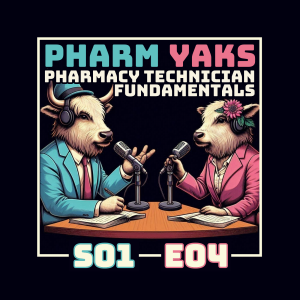
Friday Jul 26, 2024
Interpersonal Relationships
Friday Jul 26, 2024
Friday Jul 26, 2024
This conversation focuses on improving workplace relationships and patient interactions. It emphasizes conflict management, exploring various styles and strategies for resolving disagreements with coworkers and patients. The module highlights the importance of cultural competence and understanding the diverse perspectives and experiences of individuals from different backgrounds. The material stresses the critical role of empathy in building trust and rapport, emphasizing the value of active listening, nonverbal communication, and validation in connecting with others. Finally, the excerpt defines key skills essential for building trusting relationships with both colleagues and patients, including integrity, reliability, communication, and empathy.
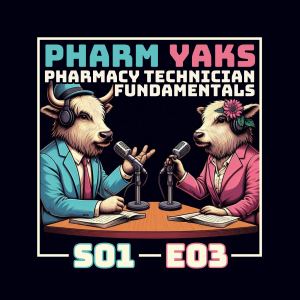
Wednesday Jul 24, 2024
Emotional Intelligence
Wednesday Jul 24, 2024
Wednesday Jul 24, 2024
This conversation is about building self-esteem and emotional strength in healthcare professionals. The lessons highlight the importance of optimism and the challenges of managing emotions in a high-pressure workplace.The hosts also discuss the positive impact of emotional intelligence on patients, including improved communication, personalized care, and better clinical outcomes.
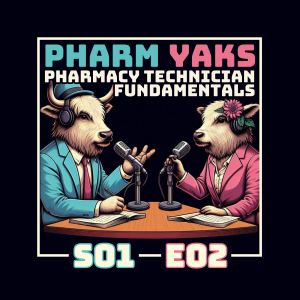
Monday Jul 22, 2024
Managing Expectations
Monday Jul 22, 2024
Monday Jul 22, 2024
This conversation outlines strategies for managing work expectations and patient interactions. It explores the impact of self-talk on performance and the patient experience, highlighting the importance of positive self-talk for fostering confidence and professionalism. It also emphasizes the significance of setting clear expectations, and the benefits of effective time management techniques like prioritization, organization, and delegation. The hosts further outline essential attributes of healthcare professionals, such as empathy, communication skills, and adaptability, as well as providing strategies for maintaining a positive attitude and managing change in the workplace.
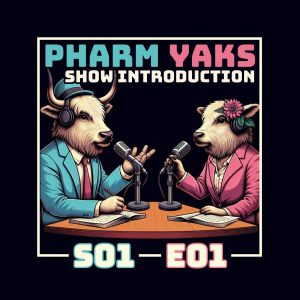
Friday Jul 19, 2024
Meet Your Curator
Friday Jul 19, 2024
Friday Jul 19, 2024
Welcome to Pharm Yaks, a human-curated podcast hosted by AI. Each season will cover a new set of material based on what I'm learning as an pharmacy technician trainee and future oncology pharmacist.Season 1 is based on my notes from Pharmacy Technician Fundamentals, a specialization certificate offered by MedCerts that consists of four Coursera courses. Season 2 will cover material from their intermediate specialization, and the rest is to be determined.In this inaugural conversation, the hosts introduce me - Adam Snetiker, the human creator of Pharm Yaks - and discuss my journey and the content of my LinkedIn profile.






